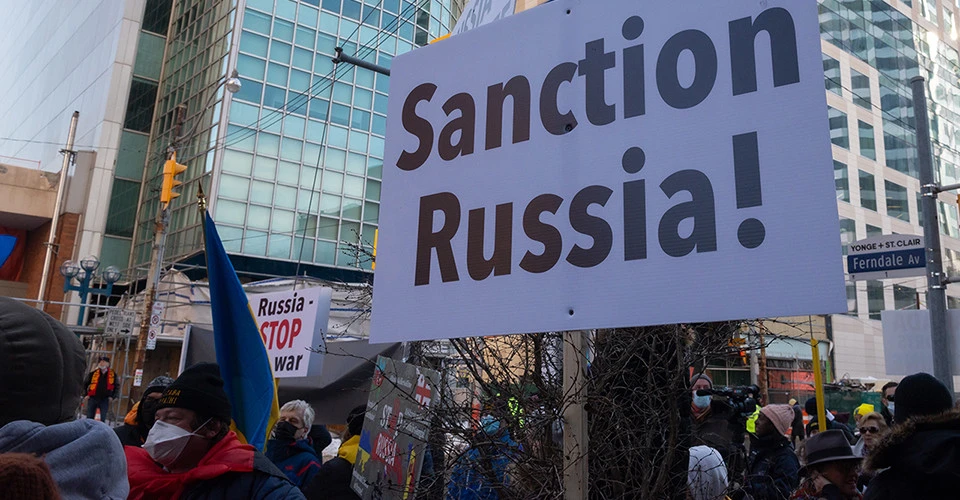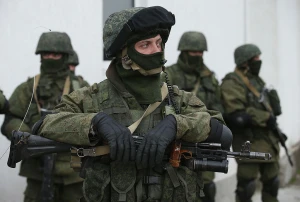
Foreign companies still contribute to funding Putin's war on Ukraine
According to research, just 17% of Western companies that had local Russian subsidiaries before the invasion of Ukraine, had left Russia
Western companies who are still present in Russia are indirectly funding the war in Ukraine by funnelling billions of dollars in taxes to Moscow, DW reports.
A new report by the Kyiv School of Economics (KSE) and B4Ukraine has found that multinationals in Russia continued to pay taxes there in 2022, indirectly financing the Kremlin's war.
Some estimates describe the cost of maintaining Russia's military operations at least $1 billion a day, placing a significant strain on Moscow's finances, especially given how sanctions against Russian energy and reduced oil and gas prices affect Moscow's main source of revenue.
Only 241 (17%) of the 1,387 Western businesses that had subsidiaries in Russia on February 24, 2022, have reportedly fully left the country, according to the report. In line with the report, companies that haven't yet left the Russian market brought in $177.2 billion (€162 billion) there last year.
Over half (56%) of the foreign businesses operating in Russia at the start of the war were still operating according to the publication of Unfinished Business by the KSE in February, which examined corporate exits.
Nearly nothing has changed even after three more months of hostilities and hard proof that Russian troops committed war crimes; according to the report, 56% of the companies KSE monitors are still committed to remaining in Russia.
Moscow earns big bucks from foreign businesses
Global enterprises, even some that have since left the war, collectively paid $3.5 billion in profit taxes in 2022 on the earnings their local Russian businesses produced.
The report added that international businesses with local subsidiaries in Russia also pay other taxes, including income tax on employee salaries, social insurance payments, and value-added taxes (VAT). "This is only the tip of the iceberg and likely a substantial underestimate of the total tax bill," the report said.
In 2022, businesses with headquarters in G7 and EU nations collectively paid the highest earnings taxes in Russia, accounting for 16 of the top 20 country donors.
According to the research, US companies have brought in the most money overall in Russia and are the greatest tax payers, paying $712 million in profits taxes in 2022.
Next are German companies. In 2022, they gave Russia a profit tax payment of $402 million.
According to the research, businesses with headquarters in current EU members paid $594 million in earnings taxes.
Economic ties between Germany and Russia 'dramatically' change
It takes some time for shifts of this magnitude to properly reflect in data, according to Michael Harms, managing director of the Eastern Committee of the German Economy. In a statement to DW, he stated, "Many German companies have now left the Russian market or are in the process of withdrawing."
"German-Russian economic relations have already changed dramatically. In 2022, German exports to Russia almost halved. Imports from Russia have fallen by 90% since the beginning of 2023. The fact that the exodus is not yet fully reflected in the statistics for 2022 is in the nature of things”, according to Harms, who also noted that many businesses are constrained by contractual obligations and cannot suddenly abandon the market
According to Harms, "the Russian government has also put up big obstacles to make it harder for foreign companies to leave."
The worst culprits are tobacco majors
While some companies, like McDonald's and Starbucks, have completely left this country, many others haven't.
International tobacco corporations have been among the worst violators, according to the KSE research. The highest gain of any company, the Japanese-Swiss tobacco powerhouse Japan Tobacco International achieved $7.4 billion in revenue in Russia in 2022, $1.5 billion more than in 2021. In 2022, it paid earnings taxes of $193 million.
Outside of the US, Phillip Morris, which sells Marlboro cigarettes, generated revenue of $7.9 billion and paid profit tax of $206 million in 2022.
In February, Philip Morris declared that it would prefer to continue operating in Russia than to sell it for less money than it believed it was worth.
The next industry, fast-moving consumer goods (FCMG), is expected to generate $21 billion in sales in Russia in 2022.
Danone, whose revenues exceeded $3 billion, is looking for a Russian buyer for its local business but has not been successful thus far. Nestle has stopped advertising there and scaled back some of its operations.
Companies have begun to adapt their language, citing "affordable, shelf-stable products" or "everyday food and hygiene products" in place of their previous "essentiality" reasoning, according to the report.
Mars, a US confectionery company, ranked among the top Russian taxpayers in 2022, paying $99 million in earnings tax. Mars announced in January of this year that it has reduced various aspects of its business in Russia.
- News














































